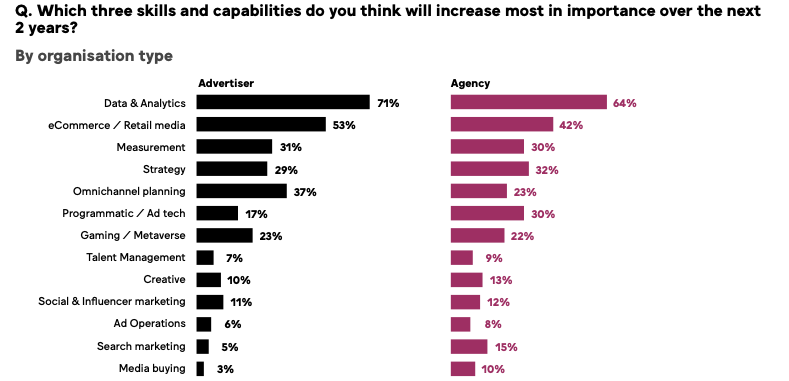We should expect better questions about media’s talent crisis

Opinion: 100% Media 0% Nonsense
As media and advertising companies report their quarterly earnings, no one seems interested in talking about the most important resource of all and why it is in such short supply.
Earnings season is upon us and it’s important to look at what analysts are asking the CEOs of media and advertising companies during investor calls.
It’s also vital to realise what questions are not being asked, because it tells a story about the apparent mismatch between what is really driving performance at companies like Publicis Groupe, Omnicom, Interpublic Groupe and WPP (which does not report its latest quarterly earnings until Friday), versus what “the market” expects. Lest we forget that these companies’ share prices are determined by their performance when compared to what the likes of Morgan Stanley and Citi tell us what to expect beforehand.
The general thrust of analysts’ questions was around the projected slowdown of adspend in the second half of the year and whether these companies are planning to tighten their costs.
A couple of them specifically asked CEOs during the earnings calls whether they were looking at headcount reductions. Uh-oh.
It was encouraging to hear IPG CEO Phillippe Krakowsky respond most strongly to this question by pointing out the owner of IPG Mediabrands and Mediahub has been hiring in “high-growth areas” and therefore there is “no proactive need to do what you suggest”.
I should hope not. Talk to any media agency or ad agency boss and they will, if they’re honest, tell you that teams are stretched. People are burned out. They can’t hire the people they need. And the ones they can hire are asking for salaries 50% higher than the agency budgeted for.
Do these analysts realise, when they’re sticking their finger in the air and coming up with revenue estimates for how these companies will perform, that media’s long-term growth is being held back by a talent crisis several years in the making?
Media’s got talent… but for how long?
This is not new. It has been simmering in the background and was put on steroids in 2020 when the ad market collapsed in response to the first Covid-19 lockdowns. Some made redundancies too quickly and couldn’t hire back the talent they lost. Many saw that people didn’t want to come back after being put on furlough. And now many of the ones that have stayed don’t want to come back into the office and teamworking is tougher to manage.
These analysts should read the highly important Media’s Got Talent? report published last week by the World Federation of Advertisers and media pitch consultant MediaSense. It canvasses the talent needs of advertisers, agencies, media owners and adtech companies.
Some of the findings are all too familiar: diversity is moving too slowly, employees don’t want to come into the office as much their employers want them too, there is a scarcity of talent for data/analytics and ecommerce/retail media roles.
But on the media planning and buying side, it’s the scarcity of generalists, not specialists, which may surprise many industry watchers as a key area of concern.
There is a discrepancy between what clients say they need and advertisers say they should provide when it comes to “omnichannel planning” — 37% of advertisers say the importance of people who can plan media across different channels will grow in importance over the next two years, whereas only 23% of agencies agree with this.

No wonder, then, that a whopping majority of advertisers (71%) say “over-specialisation” is limiting career progression, compared to less than half (47%) of agencies.
Advertisers, the report warns, want “more rounded, commercially-minded marketers, over more specialist, siloed thinking”.
So instead of asking people like Omnicom’s John Wren whether they’re thinking of getting rid of their employees to keep their profit margins at 16%, why aren’t these analysts asking about what plans they have to hire more people and invest in training their workforces when their clients are sounding the warning alarm over talent?
Or how they are addressing how this concern shared in the report: “Media has become ‘divorced’ from creative and other marketing disciplines, limiting opportunities to build broader experiences of interest to younger employees who do not yet know which specialisms to focus on.”
I would hope, if someone were to ask WPP’s Mark Read about this on Friday, he would be bold and remind the analyst community that there is still a big transformation job to do. Not only do these companies need to compete against each other, they need to compete against tech companies and management consultancies to hire the talent they will need.
The average salary at a holding company might be around $110,000, whereas consultancies like Bain, BCG or McKinsey are hiring people out of business school at nearly double that rate nowadays, according to Michael Farmer, the ad industry consultant who wrote the provocative book Madison Avenue Manslaughter.
Where are the generalists?
In my interview with Farmer (which will be published in the next couple of days), the key problem with the investment community is “they still don’t know how holding companies make money and how fragile they are with respect to [their] expertise”.
“All the talent is not coming to the industry, [and] what talent is left has gone out and is competing as freelance and the people that stay are junior,” Farmer warns. “I just don’t think that the analysts realise just exactly how fragile the staffing situation is of the agencies.”
But generalists, experienced people who can make brand strategy or media-buying decisions based on the macro media environment, seem to be in short supply. They are, as Havas Media Group’s Nick Wright and Hamid Habib like to say, people with “T shaped skills”.
We need more people in this industry with a broad base of knowledge and experience. We need someone with knowledge of traditional TV and TikTok who can tell a brand how to use both channels most effectively. As one respondent in the report said: “We desperately need to keep these [experienced] people, they are the ones who understand how to build strategies across multi platforms, youngsters do not have this experience.”
But the problem, particularly in my experience with speaking to people who work at agencies, is the middle layer of people tends to be most vulnerable — whether they are mid-weight planners or media-buyers.
The solution? Find motivated people and invest in them for the long-term by promoting a culture of constant training and upskilling. There should not be an expectation that good leadership involves telling managers to make redundancies at the first sight of trouble, then hire a load of specialists on inflated salaries.
I happened to spend an evening last week having drinks at IPG Mediabrands’ new-ish offices in the City of London. The company, which comprises agencies such as Initiative, UM and Reprise, has an enviable rooftop bar and it was full of young people letting off steam and having fun in each other’s company.
It reminded me that this industry still attracts bright, curious and sociable people who want to come to work and do something stimulating and vaguely creative while getting paid well. This is a recipe for great things to happen in business. How this is achieved should be the key question we ask our leaders as this talent crisis shows no signs of stopping soon.
 100% Media 0% Nonsense is a weekly column by the editor. Feedback is welcome in the comments or by emailing [email protected]
100% Media 0% Nonsense is a weekly column by the editor. Feedback is welcome in the comments or by emailing [email protected]





